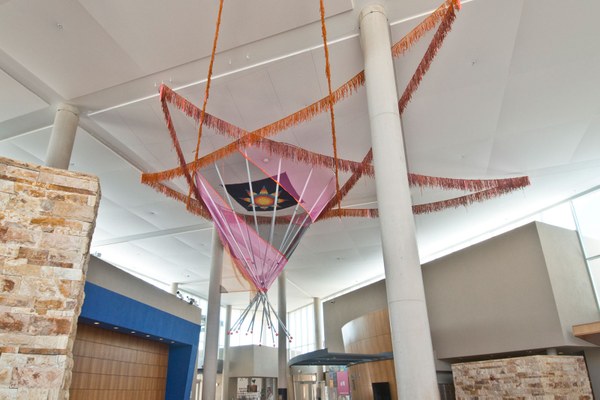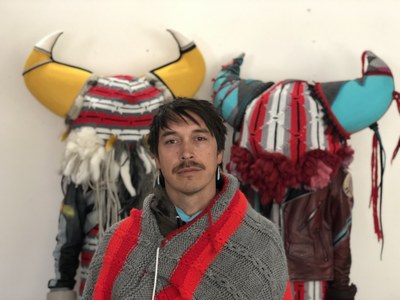Cannupa Hanska Luger
July 12, 2021–August 21, 2022
Cannupa Hanska Luger, Future Ancestral Technologies: Unziwoslal wašičuta, 2021, Repurposed industrial felt, telescoping aluminum poles, caution tape, tulle, spray paint, ribbon, fiberglass rods, paracord
Artist Conversation: Cannupa Hanska Luger and Virgil Ortiz. Albuquerque Museum hosts a conversation with two innovative Indigenous artists of our time.
Cannupa Hanska Luger, We Live, Future Ancestral Technologies Entry Log, 2019. Art direction, regalia design/construction, poetry and sound composition: Cannupa Hanska Luger. Videographer/Video editing credit: Dylan McLaughlin
About the
Albuquerque Museum
Visiting Artist Program
Since 2011, the Visiting Artist program at Albuquerque Museum has featured contemporary artists with a connection to New Mexico. The annual program provides an invited artist the opportunity to reimagine and activate the museum’s lobby, which is the first space visitors encounter upon entering the museum. The program includes the display of the artist’s work for one year, public engagement, and artist talks. The program aims to provide a bridge between the artistic practice of the visiting artist and the experience of contemporary art by the public.
The Visiting Artist program considers artists with compelling conceptual creativity. The large scale space of the museum lobby has inspired several artists to create site-specific installations. Artists, however, are given the freedom to determine how they want to interact with the space.
2011: Gronk
2012: Catalina Delgado Trunk
2013: Larry Bob Phillips
2014: Ernest Doty
2015: Lea Anderson
2016: Virgil Ortiz
2017: Paul Sarkisian
2019: Karl Hofmann
2020: Nicola López
2021: Cannupa Hanska Luger
Science fiction has the power to shape collective thinking and serves as a vehicle to imagine the future on a global scale. Cannupa Hanska Luger’s Future Ancestral Technologies is Indigenous science fiction. It is a methodology, a practice, a way of future dreaming, rooted in a continuum. Through installation and land-based work, the series developed an ongoing narrative in which Indigenous people develop sustainable, migration based technology to live nomadically in hyper-attunement to land and water. The project also prototyped designs for objects and their use and advances new materials and new modes of thinking within Indigenous methodologies. Moving sci-fi theory into practice, Future Ancestral Technologies conjured innovative life-based solutions for a highly adaptable lifestyle to live with the land, not off the land.
Luger’s installation revealed the relationship between Northern Plains technology and broader forms of knowledge within an Indigenous centered continuum to dream of a future that embraces solutions and survival. Centered in the installation was a Transportable Intergenerational Protection Infrastructure or TIPI, surrounded by an eight-point abstracted star pattern to create an inverted landscape. Witnessed is a future dream space which is not ours to inhabit, but rather asks us to pay attention to our own relationship to place. Through this science fiction motivated installation, Luger challenged our collective thinking to imagine a post-capitalist, post-colonial future where humans restore their bonds with the earth and each other, and the artist asks us to consider how we will dream of our collective future.
The visual language of the tipi and designs like the star often become pop culture symbols used to define and not always accurately describe complex and geographically diverse Indigenous peoples and cultures. Luger reclaimed and recontextualized the technology of his ancestors by placing the past and the future in dialog to demonstrate the interconnected relationships between human beings and the land.
“Consider first that this installation is not an object in space, but in time. Then imagine it is not a relic of the past but in fact, we are. Now we may relax our gaze and realize that this installation is not inverted, but that our current world is upside down. Future Ancestral Technologies looks to customs in order to move us forward, advancing new materials and new modes of thinking by utilizing science fiction theory, creative storytelling, Indigenous technology and contemporary materials to present future landscapes of harmony. ” - Cannupa Hanska Luger
Cannupa Hanska Luger
Image credit: Ginger Dunnill, 2021
About the artist: Cannupa Hanska Luger is a multidisciplinary artist who uses social collaboration in response to timely and site-specific issues. Through monumental installations that incorporate ceramics, video, sound, fiber, steel, technology and repurposed materials, Luger interweaves performance and political action to communicate stories about 21st Century Indigeneity. Raised on the Standing Rock Reservation in North Dakota, he is an enrolled member of the Three Affiliated Tribes of Fort Berthold and is of Mandan, Hidatsa, Arikara, Lakota and European descent. Luger combines critical cultural analysis with dedication and respect for the diverse materials, environments, and communities he engages and provokes diverse audiences to engage with Indigenous peoples and values apart from the lens of colonial social structuring, often presenting a call to action to protect land and water from capitalist exploits.
The Albuquerque Museum Visiting Artist Program was supported in part by a grant from the Frederick Hammersley Fund for the Arts at the Albuquerque Community Foundation.


